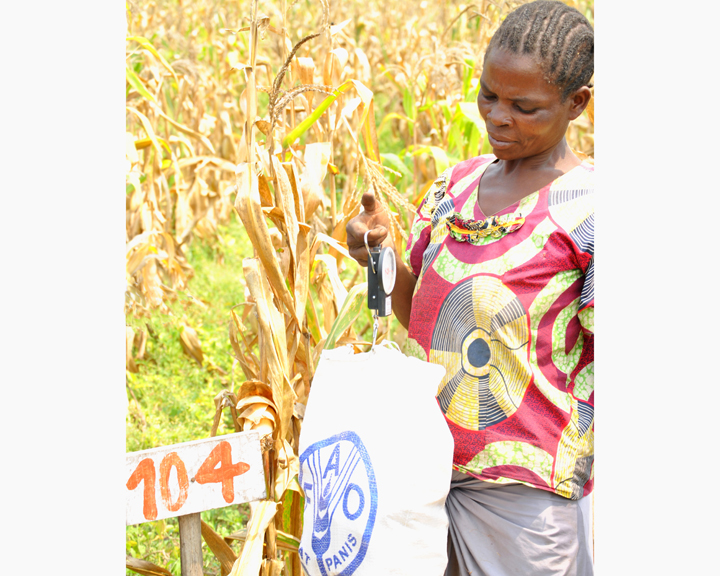

Peace and the Millennium Development Goals

As the world marks the International Day of Peace, 46-year-old Jeanne Kavira will be reaping the benefits of peace in her corner of the Democratic Republic of the Congo: a bountiful harvest of corn.
Kavira, a widowed mother of seven, has repeatedly been forced to evacuate her village of Isale-Bulambo, in North Kivu province, to escape fighting between the army, rebels and armed groups. She has lost all her possessions, crops and farm animals.
This year, though, Kavira has new hope. With support from the MDG-Fund, she and 2,500 other “returnee” families are farming donated plots of land with quality seeds, new tools and fertilizers, and learning techniques like crop rotation to improve their yield. Reconstructed irrigation canals and brand new markets in nearby towns are helping these villagers rebuild their lives after more than a decade of devastating war.
In the Democratic Republic of the Congo and 18 other conflict-prone countries around the world, the MDG-Fund is working to help build peace and solidify the conditions crucial for achieving the Millennium Development Goals.
“Violent conflict is one of the greatest obstacles to human development, one which denies millions of people their right to live healthy lives, to send their children to school and to have equal opportunities to build livelihoods for themselves,” said MDG-Fund director Sophie de Caen.
Conflict causes not only immediate suffering and depravation, but deepens poverty, inequality and economic stagnation, with children often the first victims. For example, according to UNESCO’s 2011 Global Monitoring Report, children in conflict-affected poor countries are twice as likely to die before their fifth birthday as children in other poor countries. Some 28 million children around the world are being denied an education because of armed conflicts.
The MGD-F’s Conflict Prevention and Peacebuilding programmes are built on the premise that violence is often a symptom of deep-rooted inequality and social exclusion. Their goal is to improve the livelihoods of the world’s most impoverished and marginalized citizens and give them a voice in decision-making that affects them, with a particular focus on empowering women and promoting dialogue.
“It is only by tackling the profound inequalities that divide people that we can make true progress towards achieving the Millennium Development Goals of reducing poverty and improving the health, education and wellbeing of the world’s poorest citizens and of our planet,” said de Caen.
In Lebanon, the MDG-F is working to prevent a new outburst of violence between Palestinian communities and their Lebanese hosts by strengthening both the local authorities and the Popular Committees (PCs) that are the de facto government of Palestinian refugee camps. PCs are being trained to be more inclusive and accountable, and to be better administrators and representatives of the refugees. Strengthening the camps’ governance is seen as a way to help ease tensions both amongst Palestinian groups and between Palestinian and Lebanese communities.
In the Former Yugoslav Republic of Macedonia, schools are increasingly segregated along ethnic lines, which can reinforce stereotypes and prejudices and perpetuate strife. The MDG-F is supporting Youth Centers, extra-curricular activities and in-school pilot programmes to help young people to connect with youth from other groups and teach them how to live in a multicultural society.
Urban violence in Brazil’s poor neighborhoods claims thousands of young lives every year. The MDG-F-supported “Security and Citizenship” programme there is using sports, arts and culture as creative tools to channel young people’s energy away from violence and towards the construction of positive relationships.
In the Democratic Republic of the Congo, the MDG-F programme is helping some 70,000 returnees and victims of sexual violence to reintegrate into their communities and to equitably manage the natural resources that are at the heart of the conflict there – improving their ability to produce their own food, bring it to market and build their livelihoods.
Twetamau Mausu Saphira, a villager from Bokonko in North Kivu, is farming three acres of fallow land that were leased by the programme -- a collaboration between the UNDP, FAO, UNICEF and local authorities and NGOs -- from a private land-owner for use by returnees. “I’m very satisfied with this activity!,” she said. “I regularly harvest vegetables for consumption in my household … and I’ve also been able to buy a $ 45 phone by selling eggplants and onions. With this, I am in contact with the outside world without any problems."
In Isale-Bulambo, Jeanne Kavira, weighing her corn crop recently, was thrilled to discover that her fields are yielding far more, now that she is using her newly-learned farming skills. With the increased income, she says, she will not only be able to feed her family and cover household expenses, but also pay for healthcare and ensure that her children have what they need to go to school.